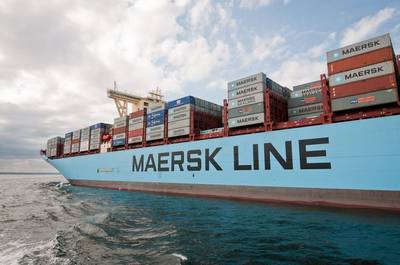Maersk to Cut at Least 10,000 Jobs as Shipping Boom Unravels
Shipping group A.P. Moller-Maersk reported a steep drop in third-quarter profit and revenue on Friday and said it would cut at least 10,000 jobs in the face of overcapacity, rising costs, and weaker prices.
Maersk, which controls about one-sixth of global container trade, transporting goods for a host of major retailers and consumer goods companies such as Walmart and Nike, flagged a steeper downturn in demand than analysts and investors had expected.
"Our industry is facing a new normal with subdued demand, prices back in line with historical levels and inflationary pressure on our cost base," CEO Vincent Clerc said in a statement.
"Since the summer, we have seen overcapacity across most regions triggering price drops and no noticeable uptick in ship recycling or idling," he said.
Shares in the Copenhagen-based group slid 11.1% by 0904 GMT, to their lowest level in three years.
Jyske Bank analyst Morten Holm Enggaard said the share price was mainly hit by Maersk saying it would reconsider whether to continue its share buy-back program into 2024.
"The only way we can read it is that we have to look into something very bad in 2024, and probably worse than what we had expected," said Enggaard.
Maersk said it expects global container volumes in its ocean business, its largest segment, to fall by up to 2% this year, primarily as a result of weak consumer demand and destocking by firms following the scramble for goods in the aftermath of the coronavirus pandemic.
The group already warned in August of a steeper decline in global demand for shipping containers by sea this year.
Maersk said it was in the process of cutting its workforce from 110,000 in January this year to below 100,000, which will result in savings next year of $600 million compared to this year.
The company kept its full-year guidance for revenue and operating profit but now expects both to land at the lower end of the range.
Underlying earnings before interest, tax, depreciation and amortization (EBITDA) dropped to $1.9 billion in the third quarter from $10.9 billion a year earlier, slightly above analysts' expectations of $1.81 billion in a Refinitiv poll. Revenues fell 47% to $12.1 billion.
(Reuters - Reporting by Jacob Gronholt-Pedersen and Louise Rasmussen, editing by Terje Solsvik, Miral Fahmy, Elaine Hardcastle)












